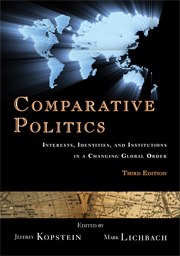Book contents
- Frontmatter
- Contents
- List of Maps
- Preface to the Third Edition
- List of Contributors
- 1 What Is Comparative Politics?
- 2 The Framework of Analysis
- PART ONE EARLY DEVELOPERS
- PART TWO MIDDLE DEVELOPERS
- PART THREE LATE DEVELOPERS
- 7 Russia
- 8 China
- STOP AND COMPARE
- PART FOUR EXPERIMENTAL DEVELOPERS
- Index
- References
8 - China
from PART THREE - LATE DEVELOPERS
- Frontmatter
- Contents
- List of Maps
- Preface to the Third Edition
- List of Contributors
- 1 What Is Comparative Politics?
- 2 The Framework of Analysis
- PART ONE EARLY DEVELOPERS
- PART TWO MIDDLE DEVELOPERS
- PART THREE LATE DEVELOPERS
- 7 Russia
- 8 China
- STOP AND COMPARE
- PART FOUR EXPERIMENTAL DEVELOPERS
- Index
- References
Summary
Introduction
China has one of the world's most ancient civilizations, dating back more than 3,000 years. It is easy for political scientists studying China to emphasize its uniqueness, as Chinese culture, language, political thought, and history appear quite different from those of any of the major Western countries. Modern Chinese history was obviously punctuated with decisive Western impacts, but the way China responded to those impacts is often considered to be uniquely Chinese. Furthermore, Chinese political leaders themselves frequently stress that they represent movements that carry uniquely Chinese characteristics. China, it seems, can only be understood in its own light.
When put in a global and comparative context, however, China loses many of its unique features. Imperial China, or the Qing dynasty, was an agricultural empire when it met the first serious wave of challenges from the West during the middle of the nineteenth century. The emperor and the mandarins (high-ranking Chinese officials) were forced to give up their treasured institutions grudgingly after a series of humiliating defeats at the hands of the Westerners. This pattern resembled what occurred in many traditional political systems when confronted with aggression from the West. From that time on, the momentum for political development in China was driven by global competition and the need for national survival. China differed from other cases in the developing world mainly in the immense dimensions of the country, not in the nature of its response.
- Type
- Chapter
- Information
- Comparative PoliticsInterests, Identities, and Institutions in a Changing Global Order, pp. 270 - 310Publisher: Cambridge University PressPrint publication year: 2008



